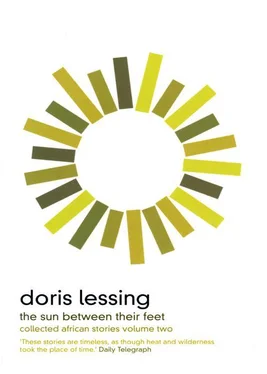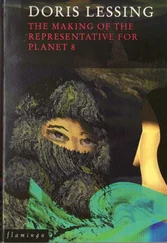Hours passed, and he watched the leaping dancing people, and listened to the drums as the stars swung over his head and the night birds talked in the bush around him. He thought steadily now, as he had not previously allowed himself to think, of what was happening inside the small dark hut that gradually became invisible as the fires died and the dancers went to their blankets. When the moon was small and high and cold behind his back, and the trees threw sharp black windows on the path, and he could smell morning on the wind, he saw the young man coming towards him again. Now Jonas shifted his feet a little, to ease the stiffness out of them, and moved the rifle along his arm, feeling for the curve of the trigger on his finger.
As the young man lurched past, for he was tired, and moved carelessly, Jonas slipped out into the smooth dusty path a few paces behind, shrinking back as the released branches swung wet into his face and scattered large drops of dew on to his legs. It was cold; his breath misted into a thin pearly steam dissolving into the moonlight.
He was so close to the man in front that he could have touched him with the raised rifle; had he turned there would have been no concealment; but Jonas walked confidently, though carefully, and thought all the time of how he had shot down from ten paces away that swift young buck as it started with a crash out of a bush into a cold moony field.
When they reached the edge of the land where acres of mealies sloped away, dimly green under a dome of stars, Jonas began to walk like a cat. He wanted now to be sure; and he was only fifty yards from the shooting platform in the corner of the field, that looked in this light like a crazy fowl-house on stilts. The young man was staggering with tiredness and drink, making a crashing noise at each step as he snapped the sap-full mealies under heavy feet.
But the buck had shot like a spear from the bush, had caught the lead in its chest as it leaped, had fallen as a spear curves to earth; it had not blundered and lurched and swayed. Jonas began to feel a disgust for this man, and the admiration and fascination he felt for his young rival vanished. The tall slim youth who had laughed down at his wife had nothing to do with the ungainly figure crashing along before him, making so much noise that there could be no game left unstartled for miles.
When they reached the shooting platform, Jonas stopped dead, and let the youth move on. He lifted the rifle to his cheek and saw the long barrel slant against the stars, which sent a glint of light back down the steel. He waited, quite still, watching the man’s back sway above the mealies. Then, at the right moment, he squeezed his finger close, holding the rifle steady to fire again.
As the sound of the shot reverberated, the round dark head jerked oddly, blotting out fields of stars; the body seemed to crouch, one hand went out as if he were going to lean sideways to the ground. Then he disappeared into the mealies with a startled thick cry. Jonas lowered the rifle and listened. There was a threshing noise, a horrible grunting, and half-words muttered, like someone talking in sleep.
Jonas picked his way along the rows, feeling the sharp leaf edges scything his legs, until he stood above the body that now jerked softly among the stems. He waited until it stilled, then bent to look, parting the chilled, moon-green leaves so that he could see clearly.
It was no clean small hole: raw flesh gaped, blood poured black to the earth, the limbs were huddled together shapeless and without beauty, the face was pressed into the soil.
‘A pig,’ said Jonas aloud to the listening moon, as he kicked the side gently with his foot, ‘nothing but a pig.’
He wanted to hear how it would sound when he said it again, telling how he had shot blind into the grunting, invisible herd.
We had discovered the Thompsons’ old house long before their first visit.
At the back of our house the ground sloped up to where the bush began, an acre of trailing pumpkin vines, ash-heaps where pawpaw trees sprouted, and lines draped with washing where the wind slapped and jiggled. The bush was dense and frightening, and the grass there higher than a tall man. There were not even paths.
When we had tired of our familiar acre we explored the rest of the farm: but this particular stretch of bush was avoided. Sometimes we stood at its edge, and peered in at the tangled granite outcrops and great ant-heaps curtained with Christmas fern. Sometimes we pushed our way a few feet, till the grass closed behind us, leaving overhead a small space of blue. Then we lost our heads and ran back again.
Later, when we were given our first rifle and a new sense of bravery, we realized we had to challenge that bush. For several days we hesitated, listening to the guinea-fowl calling only a hundred yards away, and making excuses for cowardice. Then, one morning, at sunrise, when the trees were pink and gold, and the grass-stems were running bright drops of dew, we looked at each other, smiling weakly, and slipped into the bushes with our hearts beating.
At once we were alone, closed in by grass, and we had to reach out for the other’s dress and cling together. Slowly, heads down, eyes half-closed against the sharp grass-seeds, two small girls pushed their way past ant-heap and outcrop, past thorn and gully and thick clumps of cactus where any wild animal might lurk.
Suddenly, after only five minutes of terror, we emerged in a space where the red earth was scored with cattle tracks. The guinea-fowl were clinking ahead of us in the grass, and we caught a glimpse of a shapely dark bird speeding along a path. We followed, shouting with joy because the forbidding patch of bush was as easily conquered and made our own as the rest of the farm.
We were stopped again where the ground dropped suddenly to the vlei, a twenty-foot shelf of flattened grass where the cattle went to water. Sitting, we lifted our dresses and coasted down-hill on the slippery swathes, landing with torn knickers and scratched knees in a donga of red dust scattered with dried cow-pats and bits of glistening quartz. The guinea-fowl stood in a file and watched us, their heads tilted with apprehension; but my sister said with bravado: ‘I am going to shoot a buck!’
She waved her arms at the birds and they scuttled off. We looked at each other and laughed, feeling too grown-up for guinea-fowl now.
Here, down on the verges of the vlei, it was a different kind of bush. The grass was thinned by cattle, and red dust spurted as we walked. There were sparse thorn trees, and everywhere the poison-apple bush, covered with small fruit like yellow plums. Patches of wild marigold filled the air with a rank, hot smell.
Moving with exaggerated care, our bodies tensed, our eyes fixed half a mile off, we did not notice that a duiker stood watching us, ten paces away. We yelled with excitement and the buck vanished. Then we ran like maniacs, screaming at the tops of our voices, while the bushes whipped our faces and the thorns tore our legs.
Ten minutes later we came slap up against a barbed fence. ‘The boundary,’ we whispered, awed. This was a legend; we had imagined it as a sort of Wall of China, for beyond were thousands and thousands of miles of unused Government land where there were leopards and baboons and herds of koodoo. But we were disappointed; even the famous boundary was only a bit of wire after all, and the duiker was nowhere in sight.
Whistling casually to show we didn’t care, we marched along by the wire, twanging it so that it reverberated half a mile away down in the vlei. Around us the bush was strange; this part of the farm was quite new to us. There was still nothing but thorn trees and grass; and fat wood-pigeons cooed from every branch. We swung on the fence stanchions and wished that Father would suddenly appear and take us home to breakfast. We were hopelessly lost.
Читать дальше












